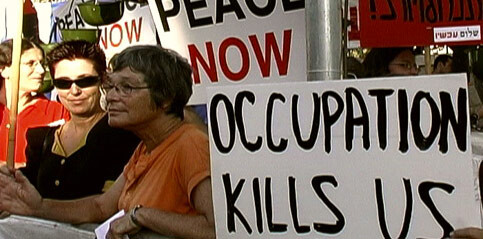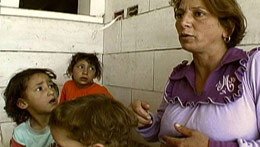The Electronic Intifada 27 June 2007

Israeli activists protest the occupation in Occupation 101.
“You begin to suspect that there is something extremely odd going on … it is deeply disturbing,” says Alison Weir, narrator of the new documentary Occupation 101, on what one experiences as soon as they read between the lines of news reports from Israel/Palestine. The film indeed succeeds in instilling this feeling in its viewers.
Newly released on DVD, Occupation 101 does not rely on dull narration or names and dates that are not relatable to the average American viewer. Best suited to educate university students, clergies, community groups, and others who do not necessarily have a firm grasp of the history and context of the conflict, this slickly produced film does take the viewer through 100 years of history. The chronology of the conflict is explained through snappily edited interviews with activists, journalists, clergy people, and others, while richly illustrated by archive footage and photographs.
The film opens with imagery from other countries that have experienced foreign military occupation — Ireland, Algeria, South Africa, and India — as well as the Civil Rights movement in the U.S. A split-screen sequence of footage paralleling Israel/Palestine and South Africa reinforces the idea that any population would resist such oppression, rebutting the myth that the conflict is an intractable and historic one between Jews and Muslims or Arabs. On both sides of the screen, the occupied population attempt to travel through checkpoints, have their IDs inspected and are arrested.
Though these parallels of injustice are obvious to those who have an understanding of the Palestinian narrative, the persistent misconceptions regarding the conflict “come from the fact that we’re only hearing one side of the story.” Occupation 101 attempts, in the course of an hour and a half, to provide that historically neglected other side of the story.
The filmmakers deftly delve back into history, explaining the origins of political Zionism in the wake of Nazi persecution of European Jews, Britain’s reneging on its promise of independence to the Arabs — particularly through the Balfour declaration that pledged a Jewish homeland in Palestine — and the proposed partition of historic Palestine at the United Nations before the state of Israel declared its independence.

A Palestinian woman recounts in Occupation 101 the day while she was pregnant that Israeli military bulldozers arrived to demolish her family’s home.
So how does Israel get away with all of this? The film explains that not only does the international community do nothing to hold accountable Israel, the US provides more aid to the state than all of sub-Saharan Africa and South America combined. “Everything Israel does in the occupied territories, US tax payers are paying for it,” Noam Chomsky states.
And with the media spin that Israel is a lone David in a sea of Arab Goliaths, the image of Palestine that prevails among the general American public is that of suicide bombers. However, through the handful of Palestinian voices we hear in the film, it is explained that the reality on the ground is a very different one. “That war zone is people’s neighborhoods,” the father of slain peace activist Rachel Corrie says of the Gaza Strip.
While at times too over-produced — the techno music that accompanies violent scenes of the second intifada a bit over the top, when such heavy imagery can really speak for itself — Occupation 101 sets itself apart from dry documentaries and would certainly hold the attention of university students and other newcomers to the conflict. It is easily a film one would recommend to those seeking to make sense of the increasingly bloody headlines that come out of this complicated part of the world.
Maureen Clare Murphy is Managing Editor of The Electronic Intifada.
Related Links





